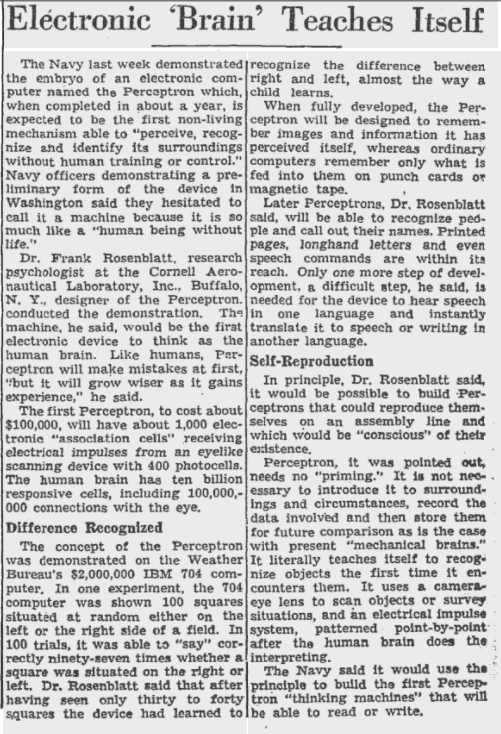AI hype was real since 1958 👀 !!
So, you heard about this thing called AI, you asked around and got recommended a few books or courses. You open the book, and in the first chapter you learn about the perceptron.
Perceptron is a simple model given by , it is a linear classifier and geometrically it splits the input space in two different classes. Perceptron learning algorithm is defined with the following update rule . See this nice introduction to perceptron and a proof (opens in a new tab) that if the data is linearly separable the perceptron learning algorithm will converge.
Every ML student has been there, the perceptron model and perceptron learning algorithm are easy to understand for begginers and make explaining more complex concepts (like neural networks) easier to comprehend. But did you know that the first implementation of the perceptron machine in 1958 took the world by storm?

This article from New York times claims that The Perceptron is "a human being without life" that could learn to recognize people, accept speech commands, perform instant language translation, self-reproduce and eventually become conscious. Frank Rosenblatt lead the team at Cornell University that created the Perceptron machine - IBM 704. The machine cost an equivalent of today's $1,057,754.33 dollars and weighted 5 tons.
The perceptron machine was an incredible invention, it set the grounds for modern neural networks that can indeed perform all tasks Frank Rosenblatt predicted. However, the perceptron machine failed to live up to unrealistic expectations of the media. This failure affected the whole field of Artificial Intelligence, dissapointment in AI grew, funding cuts followed, and it eventually resulted in what is today known as the first AI winter 1974-1980.
Today, AI is the fastest growing field, and it has found applications in various spheres from media to manufacturing. Expectations, decisions and laws we impose on AI will impact the course of human history. Some people like Eliezer Yudkowsky (opens in a new tab) say that we need to immediately stop AI research (specifically models larger than GPT4) or else "literally everyone on Earth will die". While others like Yan LeCun and Andrew Ng (opens in a new tab) believe that further AI research will amplify human intelligece and be beneficial to the society. I don't know what the correct answer is, but I think that we need to reflect back on the history of AI hype before making major irreversible decisions.